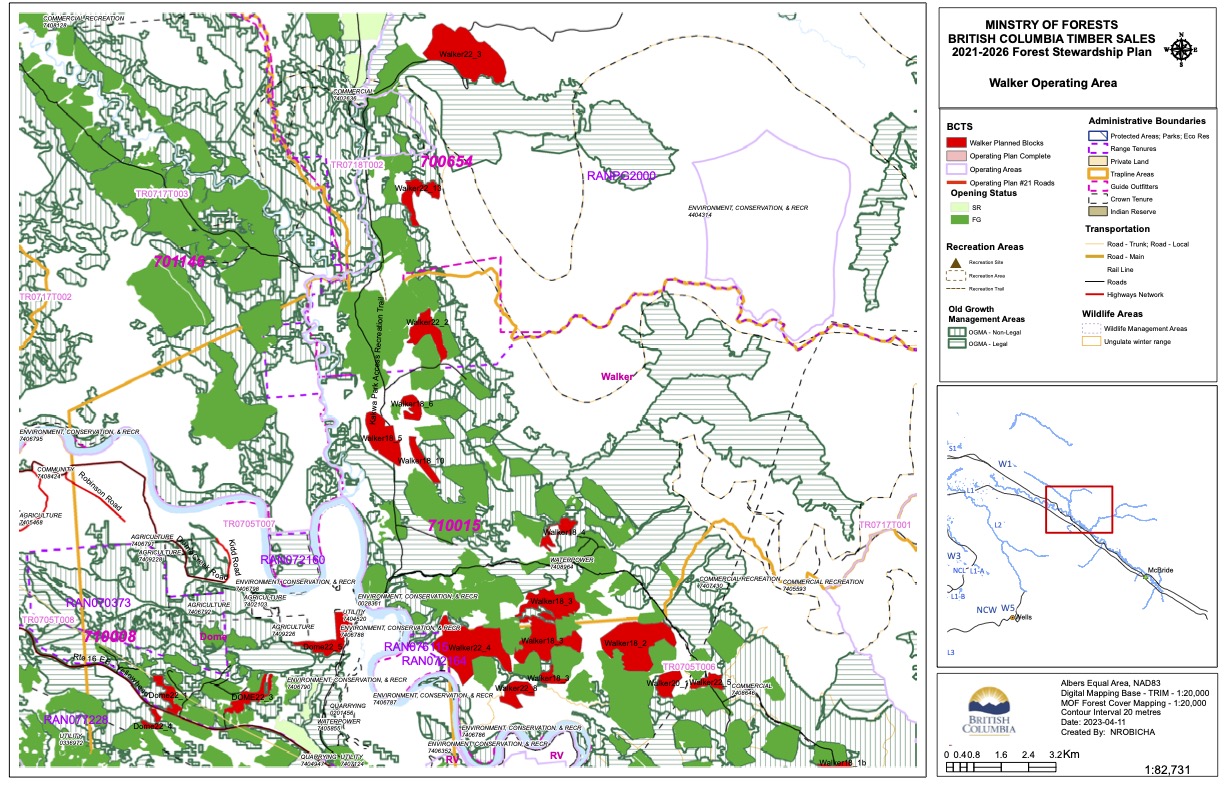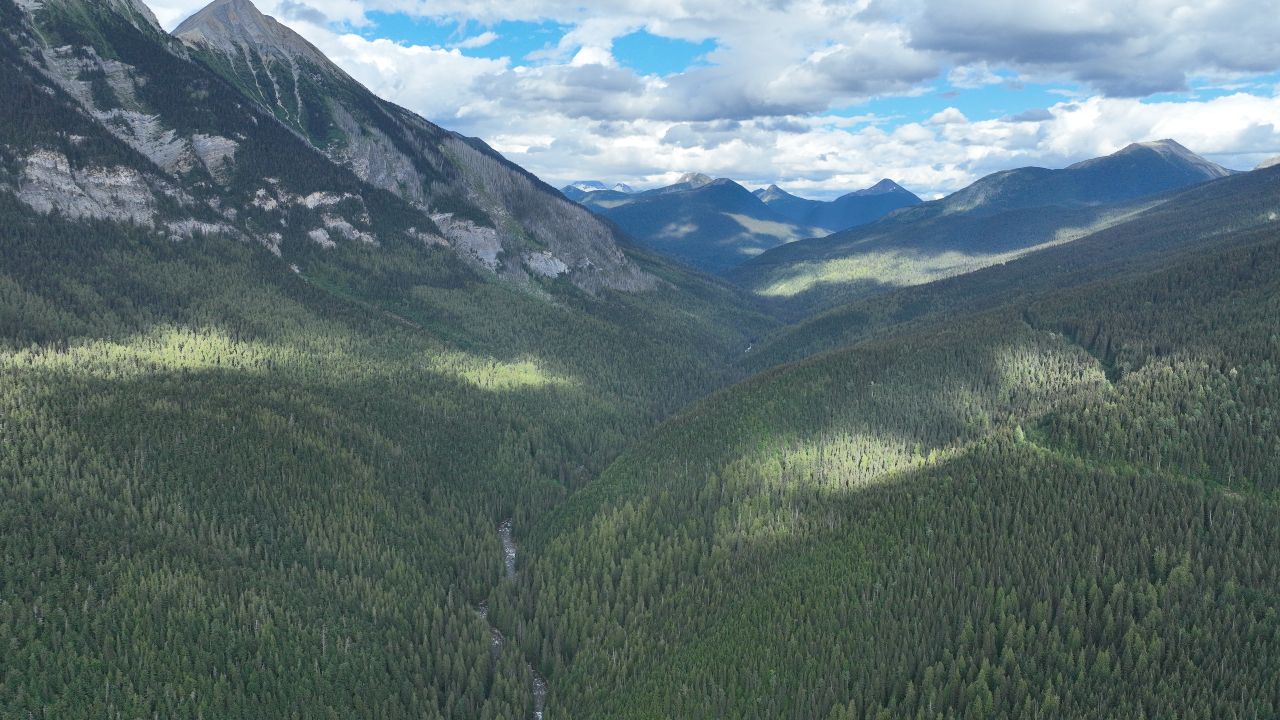Nicole Robichaud
British Columbia Timber Sales
2000 South Ospika Boulevard
Prince George, B.C.
V2N 4W5
May 6, 2024
Re: Walker operating area proposed blocks
Dear Ms. Robichaud,
Cc: Jonathan Taylor, Planning Officer BCTS; Mike McLachlan, Operations Manager BCTS; Shawn Rice, District Manager Prince George, Ministry of Forests
Thank you for responding to our letter, and for adding Conservation North, the Dome Creek Community Association and the Fraser Headwaters Alliance to your list of stakeholders for the Walker and Dome Creek operating areas.
We request that BCTS drop the Walker Planned Blocks shown in red on the Walker Operating Area map (below).
While we appreciate you acknowledging our concerns over your intention to fragment and degrade one of the last intact wilderness watersheds in our region, we must emphasize that none of your current stewardship safeguards are effective in preserving the ecosystems upon which our wildlife and biodiversity depend. As professionals charged with upholding public interest you must know this; that BCTS’s current operating paradigm contributes to the ongoing population collapses of BC’s iconic wildlife is, from a public interest perspective, unconscionable.
Since forest regulations in BC were dismantled in favour of professional reliance, we the public have relied on you the foresters to apply an ecological, holistic, and scientific lens to the work that you do. Please, therefore, do not respond to this letter with the contention that your activities are ‘legal’ or publicly condoned.
The Walker, and its adjacent unlogged watersheds, represents ideal and increasingly rare habitat for caribou and other ungulates, grizzly bear, goshawk, meso-carnivores, and spawning salmonids, and forms a critical corridor connecting southern portions of the Robson valley to Kakwa in the north. Any logging – even the construction of a single road – will ruin the intact conditions which support forest-dependent wildlife and biodiversity. In slow growing, structurally rich systems, this damage is functionally permanent.
Ensuring ecosystem health – the paradigm purported to govern BC’s future forest policy – recognizes the importance of complexifying agents (insects, fire, pathogens) for their part in the myriad energy flows of death into life which underpin the functioning of healthy, resilient, and self-regulating forests. BC’s wild plants and animals have a long evolutionary history of filling the niches provided by complex food webs that begin with the important processes of tree death and decay. Destroying habitats in the name of ‘forest health’, which is a term you used extensively in your June 2023 response to us, is antithetical to an evidence based, ecologically literate definition of true ecosystem health, which must take into account the unambiguous findings of the scientific literature on resilience in complex systems.
In today’s context, the ecological services these places offer the public, the planet, and future inhabitants vastly outweigh the ephemeral gains from turning these habitats into ecologically depleted fiber farms.
Degraded landscapes, such as those dominated by plantations, pose clear and direct threats to ecosystem health and human wellbeing. The Walker is recognized by the BC government for its values as a fisheries sensitive watershed for endangered spawning bull trout, as a host for old, intact, biodiverse primary forest, as one of the last remaining roadless areas in the Robson Valley, and as a climate refugium and safety from predation for critically endangered caribou. These values, among countless others, will be destroyed by the implementation of BCTS’ Walker Planned Blocks.
We urge you to fulfill the leadership role that BCTS can and must play in the wise stewardship of thousands of unique life forms whose continued right to exist must trump the rampant destruction of ecosystems for short-term financial gain. BCTS should focus solely on managing its existing plantations toward ecosystem health by increasing species and canopy diversity over time while eliminating roads.
The needs of most wildlife populations exceed the current size and distribution of Wildlife Habitat Areas, Ungulate Winter Ranges, and Old Growth Management Areas, which is why those policy efforts are failing. We must begin to see watersheds and surrounding buffers as the only ecologically defensible unit of analysis for landscape planning, and for your part, our governing policies and actions must immediately begin the process of setting aside large intact roadless forests if we are to leave our grandchildren with more than anger and regret. It begins here. With the Walker.
The forests of the Walker/Dome Creek area support a variety of rare species. We, a volunteer organization, have done the work of completing a preliminary floristic inventory for the region. In summer 2023, botanist Curtis Bjork was employed to locate and document plant, lichen, and bryophyte diversity in representative ecosystem types within the Walker. That report is attached for your reference.
Again, we request that BCTS drop the Walker Planned Blocks shown in red on the Walker Operating Area map (below).
Sincerely,
Michelle Connolly
On behalf of Conservation North


